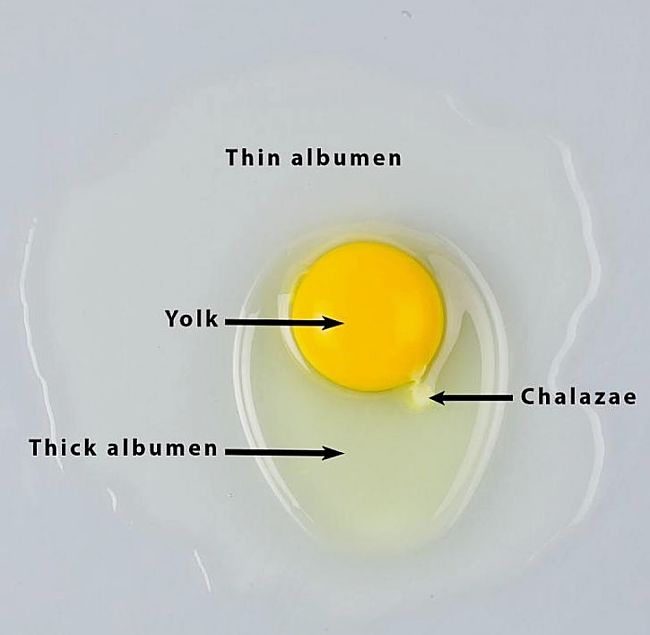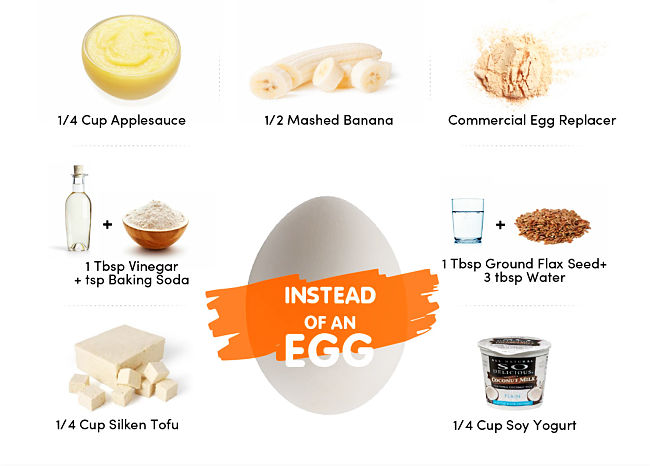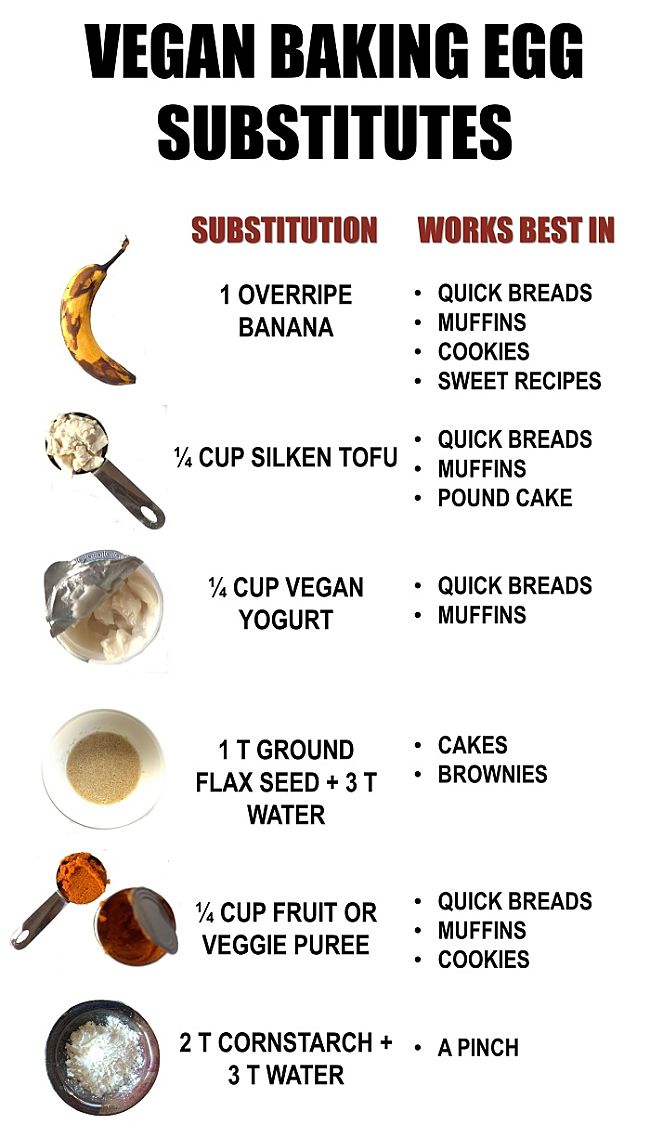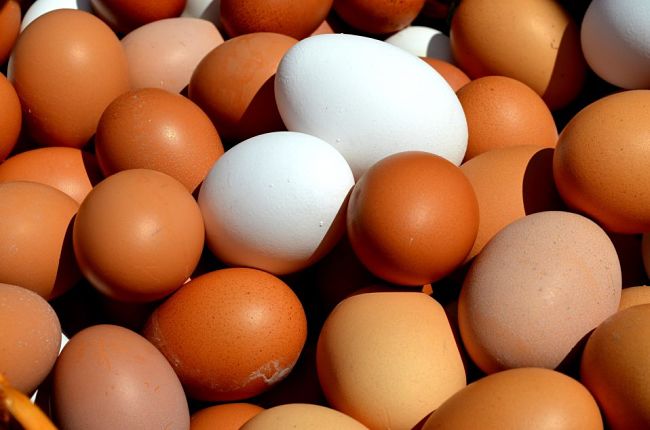Vegan Egg Substitutes for Baking, Cooking - Best Egg Replacements - Guide and Tips
Eggs are such a vital part of cooking, especially baking, that their replacement creates a special challenge for vegans and people who want to eat fewer eggs in their diet.
Many people are concerned about the health and animal welfare issues associated the poultry industry, both for chicken meat and eggs.
Many people also have allergies for eggs and egg products.
So what are the best egg substitutes for baking and cooking?
Learn how to choose the best egg replacements for various purposes in cooking and baking: binding, moisture, leavening, taste, texture and composition.
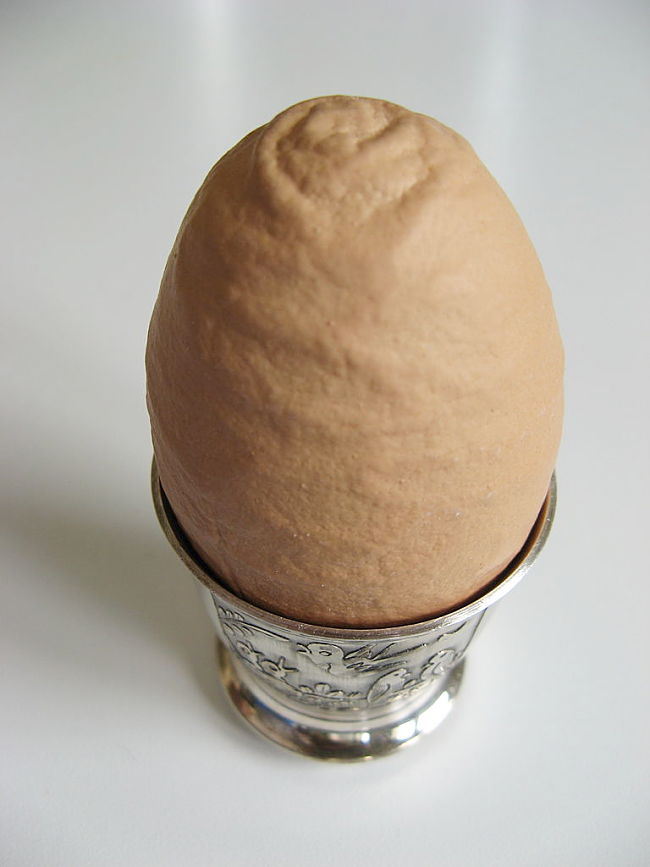
Role of Eggs in Cooking and Baking
To find the best substitutes we firstly need to understand what role and function eggs play in cooking and baking. It is likely that a particular egg substitute may perform a given role better than others.
Good replacement binders may not provide adequate substitutes for taste and texture. Egg whites and yolks perform different functions and roles in recipes. Are there genuine vegan replacements that perform all the roles of eggs and their components.
► Eggs Provide Moisture, Thickening and Richness
Often recipes contain little extra moisture apart from the egg which provide moisture for the starch. Egg yolks add fat and help emulsify the batter providing a smooth and creamy texture for baked goods. Egg yolks add richness to the taste, especially for sauces.
► Eggs Provide Leavening
Beaten egg whites lock air bubbles in the batter helping the it rise when cooked. Substitutes need to provide this leavening function and the binding needs to lock air bubbles in the batter.
► Egg Whites Act as a Binder
The egg whites act as strengthen and bind the ingredients together in the batter. Egg white is rich in protein and a good substitute needs to prove this 'glue' and binding function. Protein rich substitutes such as tofu and vegan yogurt, can replace this function to some extent, but the balance of other ingredients may need to change such as reducing the amount of oil or liquid in the recipe to make it thicker. Egg components, both whites and yolks, become firm when heated and this function need to be replaced in the recipe.
► Eggs Yolks Provide Color and Flavor
Egg yolks add richness, color, and a unique flavor to recipes. Vegan cheese, yogurt and tofu with added flavors can provide substitutes
► Eggs Provide Protein, Amino Acids and Nutrition
Eggs are rich in protein and are very nutritious. Substitutes should replace these functions.
► Eggs are Vital Components of Recipes and Cooking Methods
Many recipes are designed specifically to use eggs as vital ingredients. Making substitutes for almost inevitably means changing the recipe as well as adding a replacement
Best Egg Substitutes and Replacements for Baking and Cooking
Commercial Vegan Egg Substitute Powders
There are a number of egg substitute powders available such as 'Neat egg' and 'Ener-G Egg Replacer'. These are a good all-round replacements, but may not replace all the functions of real eggs. They generally have a neutral paste and some people are concerned about which may be in them. Making your own substitute has merits.
These commercial powders are egg-free and generally contain ingredients such as gluten, wheat, soy, tree nuts, yeast and peanuts.
Beware that some egg substitute powders contain gelatin, casein, and other dairy products, which may be unacceptable for vegans and other vegetarians.
Quick Guide for Egg Replacements
► 1 egg = 1/4 cup puréed prunes
► 1 egg = 1/4 cup mashed potatoes
► 1 egg = 2 tablespoons potato starch
► 1 egg = 1/4 cup canned pumpkin or squash
► 1 egg = 1 tablespoon ground flax seed simmered in 3 tablespoons water
► 1 egg = 1 tablespoon oil + 2 tablespoons water + 2 teaspoons baking powder (adds leavening)
► 1 egg white = 1 tablespoons plain agar (or pectin) powder dissolved in 1 tablespoons water, whisked, chilled, and whisked again
Egg Substitute Tips
► Learn by trial and error how much of each substitute is required to replace one or more eggs. If the recipe call for three eggs the amount of the replacement used may be more or less. Similarly you may want to use more than one substitute to replace all the functions, for example binding, leavening and taste.
► Look for recipes that require few rather than trying to do the impossible. Better still find vegan or egg free recipes.
► Always puree tofu, selecting a firm plain variety, before using it in a recipes recipe to avoid chunks in the dish and baked goods.
► Egg replacements cannot be used to create egg-rich recipes such as omelets, scramble eggs, devilled eggs and soufflés. Tofu is a good replacement but a separate recipe is required.
► Fruit and vegetable purées such as banana and avocado can make the batter heavy. Add an extra 1/2 teaspoons baking powder to counteract this effect.
► Good binding substitutes are 2 to 3 tablespoons of any of the following for each egg: 1/4 cup tofu puréed with 1 tablespoons flour, instant potato flakes, mashed sweet potatoes, mashed potatoes, whole wheat flour, arrowroot powder, potato starch or tomato paste. Agar and Pectin, a fiber found in fruit, used as setting agent for jams are good thickeners and binders (see below for details).
► Vegan Yogurts and cheese are good substitute for the taste and texture that eggs provide.
Egg Substitute Recipes and Mixtures
► Flax as Vegan Egg Substitute
Flax seed is high in omega-3 fatty acids and has many other nutritional benefits. Flaxseed meal is ground from raw flax seeds and can be used as an egg replacements. You can grind flax seeds in a spice grinder or mortar and pestle. Flaxseed 'eggs' work well in pancakes, waffles, quick breads, muffins, thicker (not delicate) cookies and many cakes. Extra leavening may be required. The nutty taste may not suit savory items and some cakes.
Method: Mix 1 tablespoon flaxseed meal with 2 tablespoons of water. Let rest for 15-20 minutes to thicken, before adding to it to recipes. This mixture replaces 1 egg.
► Chia Seed as Vegan Egg Substitute
Chia seeds are similar to flax seed, being rich in fiber and omega-3 fatty acids. Chia seeds, when ground to a powder and mixed with water, then thicken more than flax seeds when used in the recipe. Chia seeds provide an excellent binding agent for baked goods.
Method: To replace one large egg, grind 1 tablespoon of chia seeds in a spice grinder or mortar and pestle. Add to 3 tablespoons of water in a small bowl. Allow to sit for 20-30 minutes before using in a recipe. The mixture will thicken considerably to a gel-like consistency. Add a pinch of baking powder and mix well before adding to a recipe to replace one egg.
► Tofu as Vegan Egg Substitute
Tofu is great for dishes such as quiches, custards, vegan style omlets and scrabbles, that generally have a lot of eggs and rely on the high protein of eggs and consistency to set the mixture when cooked.
Method: To replace one egg, purée 1/4 cup soft silken tofu. The mixture will not fluff up like beaten egg but it will set like egg when cooked.
► Banana as Vegan Egg Substitute
Banana adds moisture, sweetness and texture and works well in muffin, breads, pancakes and cakes. It has no binding capacity and so you may need to add agar or tofu to provide this function.
Method: Add 1/2 to 1 mashed banana to replace each egg.
► Avocado and other Vegetable Purees as Vegan Egg Substitutes
You can use avocado and many other options in a similar way to bananas.
► Vegan Yogurt, Non Dairy Yogurt as Vegan Egg Substitutes
Non-dairy vegan yogurt and vegan cheeses are just as effective as traditional dairy yogurt as an egg substitute in many baking applications. But it does not provide binding power and something else such as agar may be needed as well. These dairy substitutes work well for vegan cakes, pancakes, waffles, muffins and softer style biscuits and slices.
Method: 1/4 cup soy or coconut yogurt, or almond cheese and similar, replaces one egg.
► Baking Soda and Vinegar as Vegan Egg Substitute
This is a simple substitute replacing the leavening in fluffier baked goods when eggs are omitted.
Method: Combine 1 tablespoon of white vinegar with 1 teaspoon of baking soda, just before adding to the mixture to replace one egg.
► Applesauce and Pureed Fruit as Vegan Egg Substitutes
Similar to vegetable purees and banana, fruit can be used, but it lacks the binding and leavening function of real eggs.
Method: 1/4 cup applesauce or pureed fruit replaces one egg.
► Agar as Vegan Egg Substitute
Agar is an excellent way to replace the binding and thicken function of real eggs.
Method: To replace one large whole egg, dissolve 1 tablespoon of agar powder in 3 tablespoons of warm water. Whisk to dissolve, chill for 10 minutes and whisk again before using. To use agar to replace one egg white, dissolve 1 tablespoon of plain agar powder in 1 tablespoon of warm water. Whip, chill and whip before using.
► Pectin as Vegan Egg Substitute
Pectin is a natural fiber found in fruit that is used to help jams set. It is similar to agar.
Method: Add 1-2 teaspoons to replace each egg in bread, muffin, pancake and cake recipes.
